Book Launch Seminar Looks at How Foreign Models of Economic Development Can Be Effectively Learned by Latecomer Countries
2024.05.31
Learning foreign knowledge and technologies is essential for economic development. Moreover, such learning needs to take place ‘locally’. The recently published book, "Introducing Foreign Models for Development: Japanese Experience and Cooperation in the Age of New Technology," explores Japan's experience in this area. On April 22, 2024, the JICA Ogata Sadako Research Institute for Peace and Development (JICA Ogata Research Institute) held a book launch seminar to offer a fresh perspective on learning and knowledge co-creation for economic development, considering the challenges posed by the Sustainable Development Goals (SDGs) and digitalization.
Hosono Akio, senior research advisor at the JICA Ogata Research Institute, highlighted the two key aspects of the book through the lens of “translative adaptation.” Firstly, it involves the deliberate selection and modification of foreign knowledge and technologies, tailored to suit the specific circumstances of the local society, while being heavily influenced by prevailing global trends. Secondly, the book takes into account the rapidly evolving landscape of industrial development, considering major trends such as globalization, digital transformation, and the growing emphasis on inclusive, sustainable and resilient development. Hosono underlined the added value that the book brings to existing research and discourse on industrialization. Firstly, it addresses the question of how countries can enhance their ability to learn from external knowledge and technology, and effectively adapt them to suit the local context. Secondly, it offers insights from Japan's past experiences and its extensive development cooperation efforts. Lastly, it combines theoretical perspectives with concrete case studies, Hosono explained.
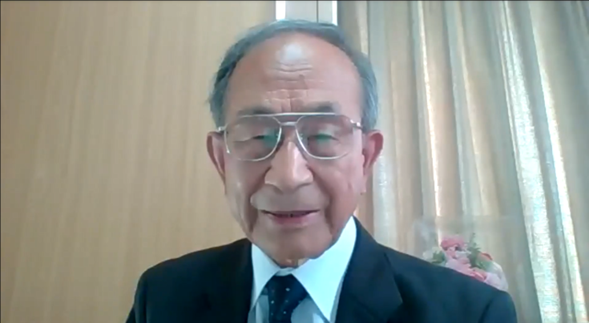
Hosono Akio, senior research advisor of the JICA Ogata Research Institute
Ohno Izumi, senior research advisor at the JICA Ogata Research Institute and professor emeritus at the National Graduate Institute for Policy Studies (GRIPS), provided an overview of this book by explaining the key concepts and analytical framework and highlighting selected case studies. The concept of translative adaptation was originated from Maegawa Keiji's anthropological theory, which refers to the dynamic interaction of foreign and domestic systems in the process of modernization. Ohno discussed how this concept can be applied to the development context, describing a three-stage process of translative adaptation and local learning. For developing countries, it is vitally important to build an internal mechanism that continuously absorbs foreign knowledge and adapts to the local context. Ohno then explained several case studies including Japan’s past learning experiences during Meiji modernization and postwar high-growth periods, Japanese development cooperation such as bilateral policy dialogue and industrial human resource development. Amongst several findings of the case studies, Ohno highlighted public-private partnerships as a factor in achieving policy and societal learning.
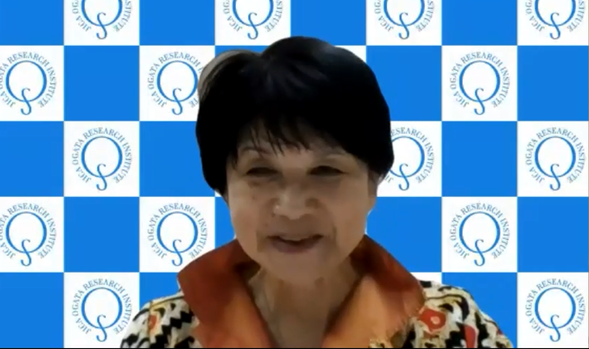
Ohno Izumi, senior research advisor at the JICA Ogata Research Institute
Jin Kimiaki, chief advisor, Quality and Productivity Improvement (Kaizen) Project in South Africa, JICA, explained the outline of JICA’s activities in promoting Kaizen in Africa by discussing the Africa Kaizen Initiative (AKI). He briefly discussed the recent history of the evolution of Kaizen and private sector development in Africa, drawing on the economic growth that African economies witnessed during the early 2000s. He also expounded on the concept of “learning by doing” as one of the key characteristics of the Japanese development cooperation. Jin concluded that national commitment, organizational infrastructure, and standardization are the key factors in achieving a successful national movement of quality and productivity improvement (QPI) program.
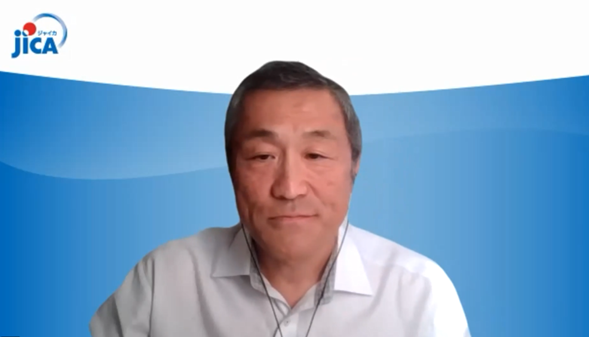
Jin Kimiaki, chief advisor, Quality and Productivity Improvement (Kaizen) Project in South Africa, JICA
In a video message, Getahun T. Mekonen, certified principal Kaizen consultant, Ethiopia, explained how Ethiopia customized the Japanese Kaizen to the Ethiopian way based on a TISSO model, which consists of five steps: testing, institutionalizing, implementing, owning and sustaining. He also emphasized that donors should consider the circumstances of the partner countries while designing cooperation programs.

Getahun T. Mekonen, certified principal Kaizen consultant, Ethiopia, explained how Ethiopia adapted the Japanese model of Kaizen to the local context.
Joonghae Suh, senior fellow emeritus, Korea Development Institute (KDI), contended that the Japanese way of productivity improvement has been applied in different contexts, including South Korea. He praised the Ethiopian case for emphasizing the role of public institutions posing as partners of international cooperation agencies, due to the weakness of private enterprises in some developing economies. According to Suh, the recent emerging challenges in the age of digital transformation and artificial intelligence require the involvement of a wider range of actors such as civil society and universities.
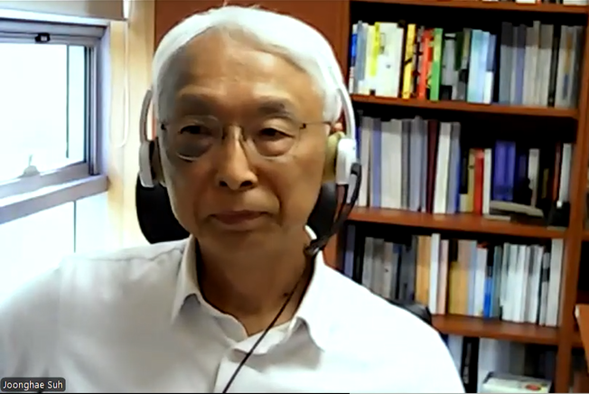
Joonghae Suh, senior fellow emeritus, Korea Development Institute (KDI)
In his comments, Stephan Klingebiel, head of Inter and Transnational Cooperation Research Program at the German Institute of Development and Sustainability (IDOS) and visiting professor at the University of Turin and Ewha Womans University, Seoul, pointed out that knowledge is fundamental for industrial development, and explained why the Rwandan case of South-South Cooperation is distinguished in relation to the concept of “silent knowledge”, where the approach to implementing the cooperation is more significant. He also stressed the significance of power relations among partner countries in shaping knowledge cooperation.
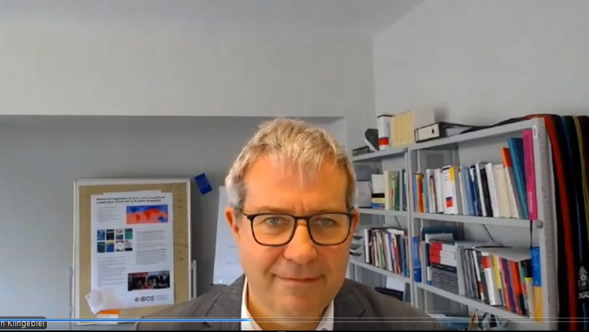
Stephan Klingebiel, head of Inter and Transnational Cooperation Research Program at the German Institute of Development and Sustainability (IDOS)
Panel discussions followed, moderated by Junichi Mori, former chief technical advisor to the Skills for Prosperity Program in Malaysia, ILO, with kick-off comments by Toru Homma, senior advisor to the CEO, AUDA-NEPAD / senior advisor on private sector development, JICA and by Kuniaki Amatsu, director of partnership program division, JICA Kyushu. They are also contributors to the book.
The video recording is available by clicking the link below.

事業事前評価表(地球規模課題対応国際科学技術協力(SATREPS)).国際協力機構 地球環境部 . 防災第一チーム. 1.案件名.国 名: フィリピン共和国.

事業事前評価表(地球規模課題対応国際科学技術協力(SATREPS)).国際協力機構 地球環境部 . 防災第一チーム. 1.案件名.国 名: フィリピン共和国.

事業事前評価表(地球規模課題対応国際科学技術協力(SATREPS)).国際協力機構 地球環境部 . 防災第一チーム. 1.案件名.国 名: フィリピン共和国.

事業事前評価表(地球規模課題対応国際科学技術協力(SATREPS)).国際協力機構 地球環境部 . 防災第一チーム. 1.案件名.国 名: フィリピン共和国.

事業事前評価表(地球規模課題対応国際科学技術協力(SATREPS)).国際協力機構 地球環境部 . 防災第一チーム. 1.案件名.国 名: フィリピン共和国.
scroll